 This image provided by Abbot in September 2021 shows packaging for their BinaxNOW self test for COVID-19. President Joe Biden is betting on millions more rapid, at-home tests to help curb the latest deadly wave of the COVID-19 pandemic, which is overloading hospitals and threatening to shutter classrooms around the country. But the tests have already disappeared from pharmacy shelves in many parts of the U.S., and manufacturers warn it will take them weeks to ramp up production, which was slashed after demand for the tests plummeted over the summer of 2021. (Abbot via AP)
This image provided by Abbot in September 2021 shows packaging for their BinaxNOW self test for COVID-19. President Joe Biden is betting on millions more rapid, at-home tests to help curb the latest deadly wave of the COVID-19 pandemic, which is overloading hospitals and threatening to shutter classrooms around the country. But the tests have already disappeared from pharmacy shelves in many parts of the U.S., and manufacturers warn it will take them weeks to ramp up production, which was slashed after demand for the tests plummeted over the summer of 2021. (Abbot via AP)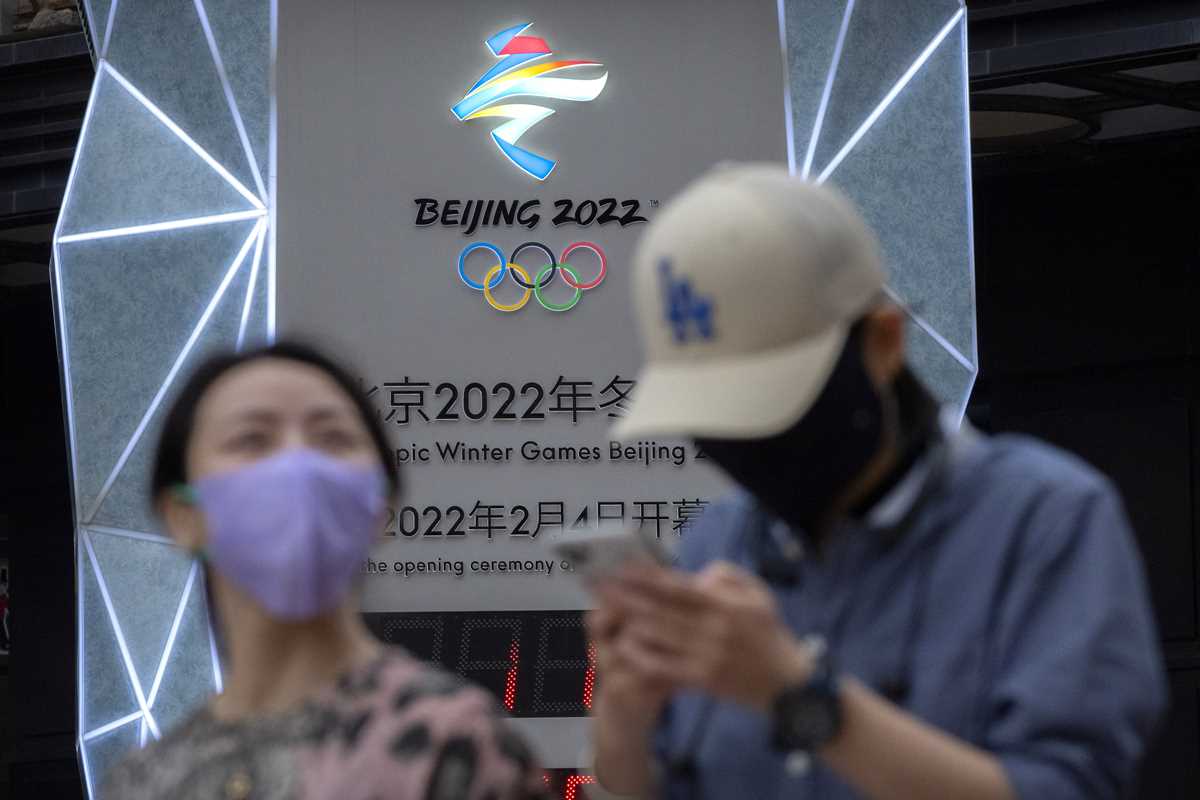 People wearing face masks to protect against COVID-19 walk past a display showing a countdown clock to the Beijing 2022 Winter Olympics in Beijing, Wednesday, Aug. 18, 2021. China's "zero tolerance" strategy of trying to isolate every case and stop transmission of the coronavirus has kept kept the country where the virus first was detected in late 2019 largely free of the disease. (AP Photo/Mark Schiefelbein)
People wearing face masks to protect against COVID-19 walk past a display showing a countdown clock to the Beijing 2022 Winter Olympics in Beijing, Wednesday, Aug. 18, 2021. China's "zero tolerance" strategy of trying to isolate every case and stop transmission of the coronavirus has kept kept the country where the virus first was detected in late 2019 largely free of the disease. (AP Photo/Mark Schiefelbein)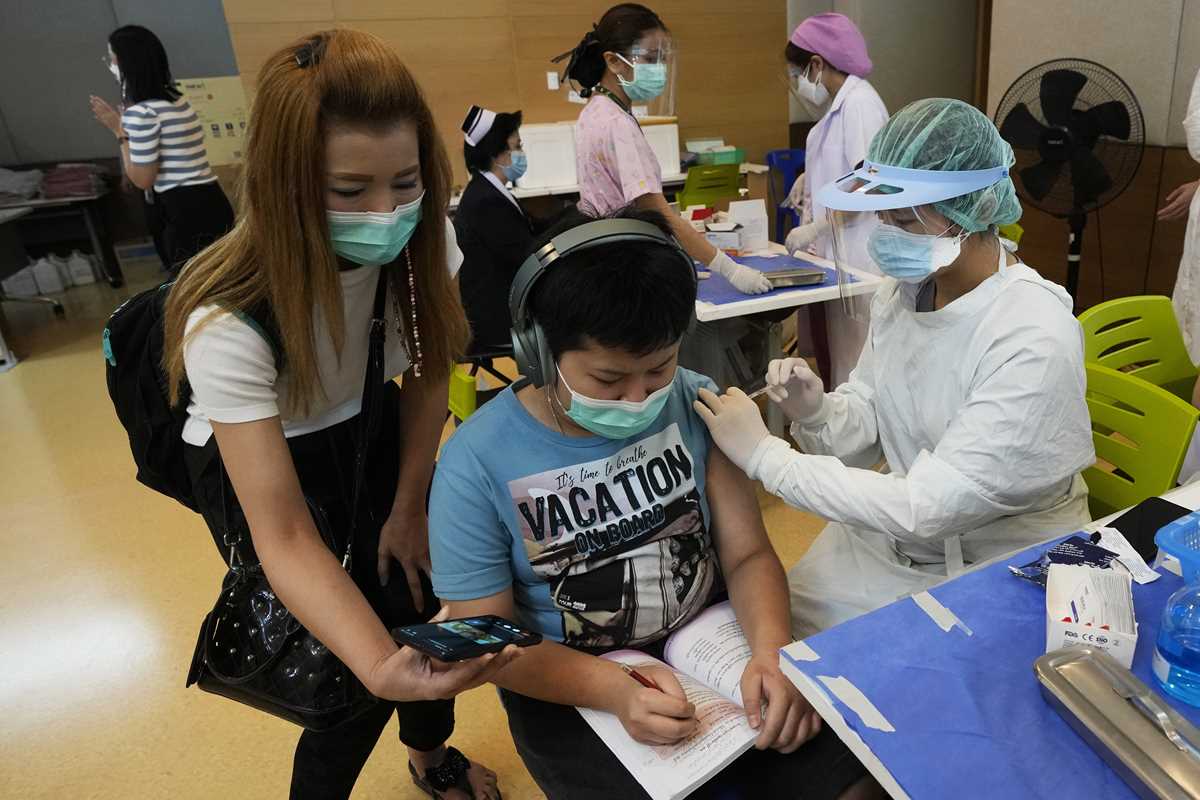 Patchara Chuntatrakulchai, mother of Pacharadon, holds a mobile phone for her son as he taking an online exam while receiving the Pfizer-BioNTech COVID-19 vaccine at a hospital in Bangkok, Thailand, Tuesday, Sept. 21, 2021. Bangkok Metropolitan Administration inoculated 12-18 year old students Tuesday as part of its attempt to reopen on-site schools. (AP Photo/Sakchai Lalit)
Patchara Chuntatrakulchai, mother of Pacharadon, holds a mobile phone for her son as he taking an online exam while receiving the Pfizer-BioNTech COVID-19 vaccine at a hospital in Bangkok, Thailand, Tuesday, Sept. 21, 2021. Bangkok Metropolitan Administration inoculated 12-18 year old students Tuesday as part of its attempt to reopen on-site schools. (AP Photo/Sakchai Lalit)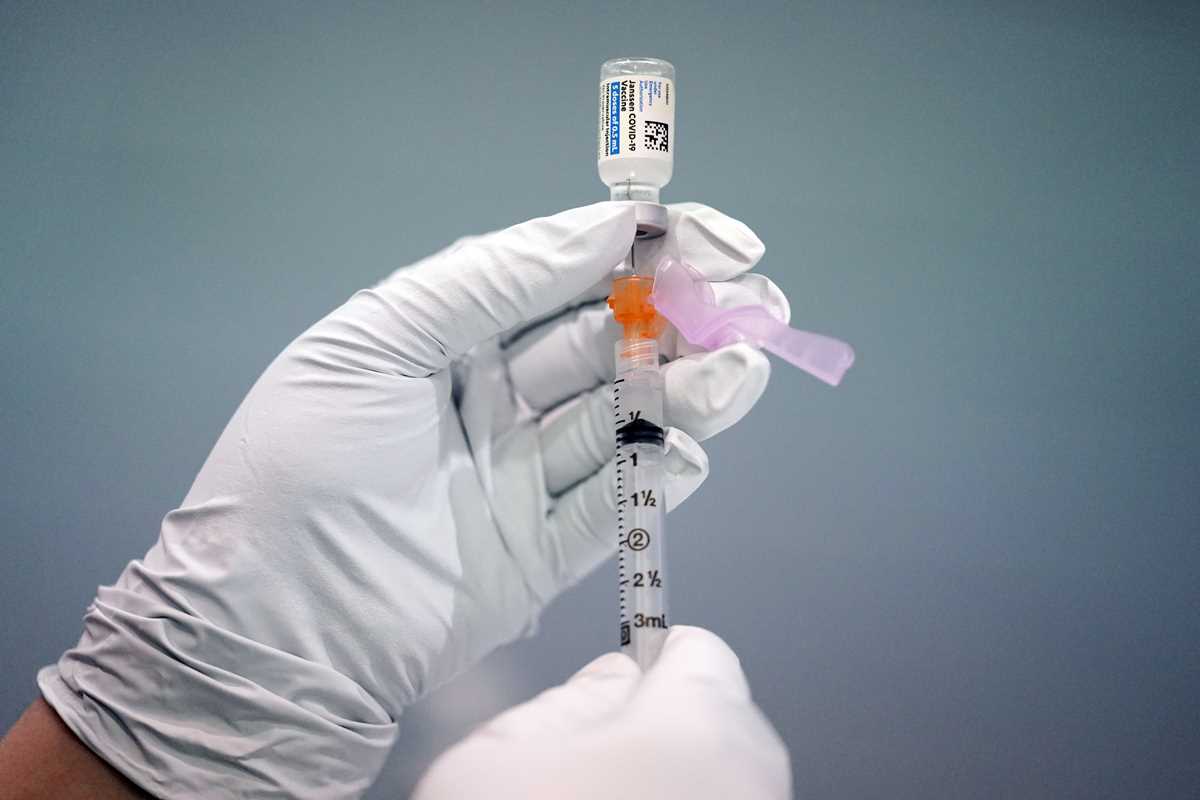 In this March 26, 2021, file photo a member of the Philadelphia Fire Department prepares a dose of the Johnson & Johnson COVID-19 vaccine at a vaccination site setup in Philadelphia. Religious objections, once used only sparingly around the country to get exempted from various required vaccines, are becoming a much more widely used loophole against the COVID-19 shot. (AP Photo/Matt Rourke, File)
In this March 26, 2021, file photo a member of the Philadelphia Fire Department prepares a dose of the Johnson & Johnson COVID-19 vaccine at a vaccination site setup in Philadelphia. Religious objections, once used only sparingly around the country to get exempted from various required vaccines, are becoming a much more widely used loophole against the COVID-19 shot. (AP Photo/Matt Rourke, File)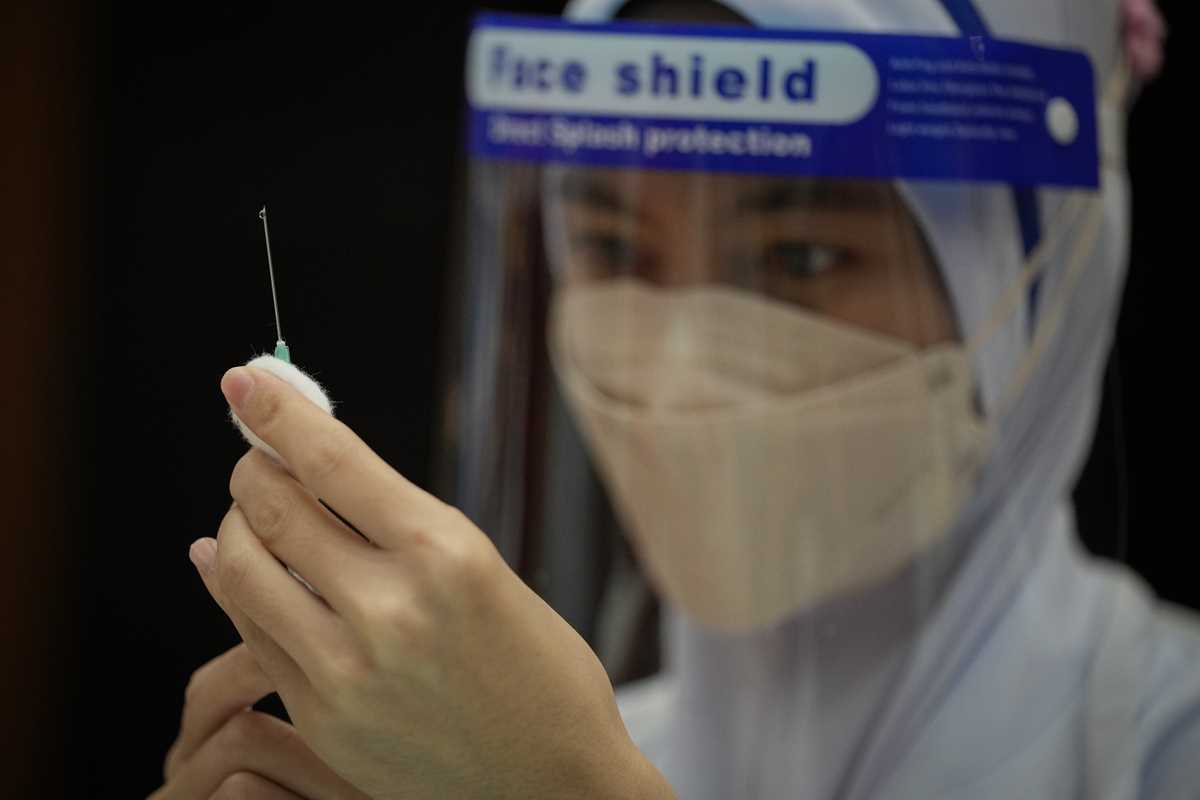 A Nurse prepares a dose of the Pfizer vaccine against the coronavirus disease (COVID-19) for a secondary school student at a vaccine center in Shah Alam, Malaysia, Monday, Sept. 20, 2021. (AP Photo/Vincent Thian)
A Nurse prepares a dose of the Pfizer vaccine against the coronavirus disease (COVID-19) for a secondary school student at a vaccine center in Shah Alam, Malaysia, Monday, Sept. 20, 2021. (AP Photo/Vincent Thian)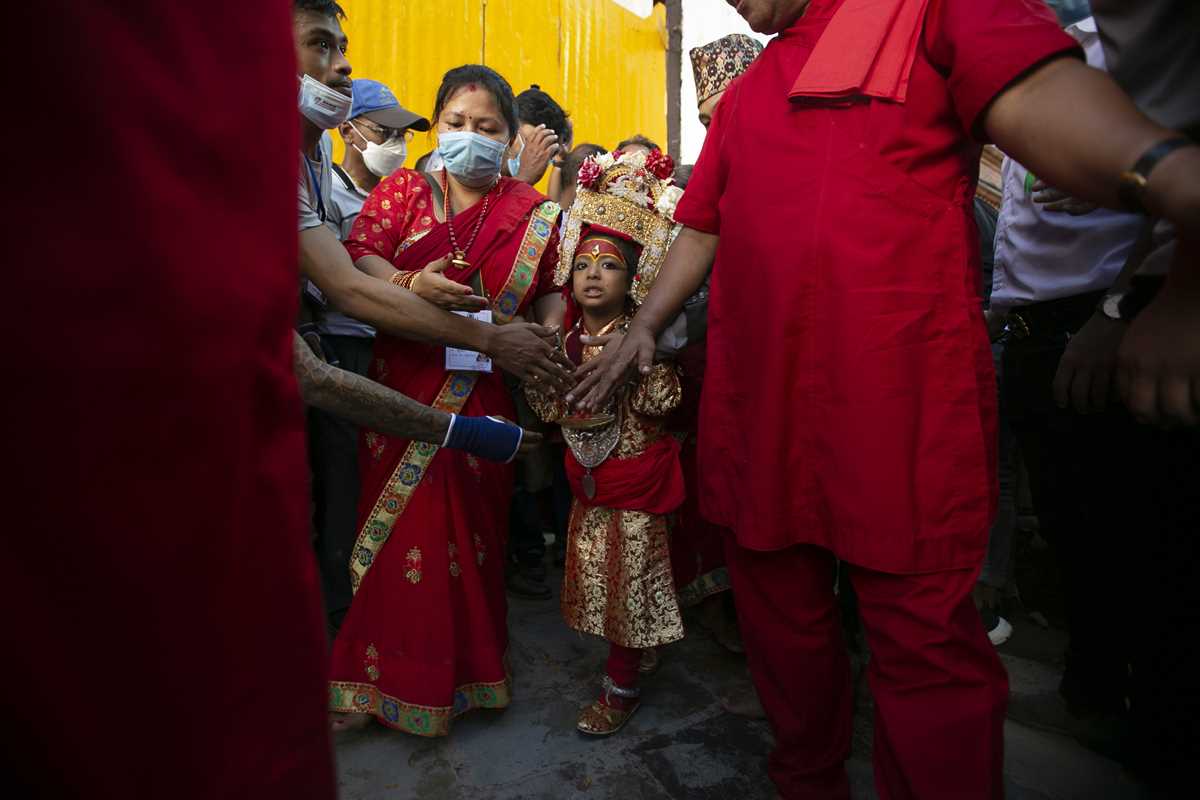 Nepal's revered living god Bhairabh walks towards a chariot during the annual Indra Jatra festival in Kathmandu, Nepal, Sunday, Sept. 19, 2021. The feast of Indra Jatra marks the return of the festival season in the Himalayan nation two years after it was scaled down because the pandemic. (AP Photo/Niranjan Shrestha)
Nepal's revered living god Bhairabh walks towards a chariot during the annual Indra Jatra festival in Kathmandu, Nepal, Sunday, Sept. 19, 2021. The feast of Indra Jatra marks the return of the festival season in the Himalayan nation two years after it was scaled down because the pandemic. (AP Photo/Niranjan Shrestha)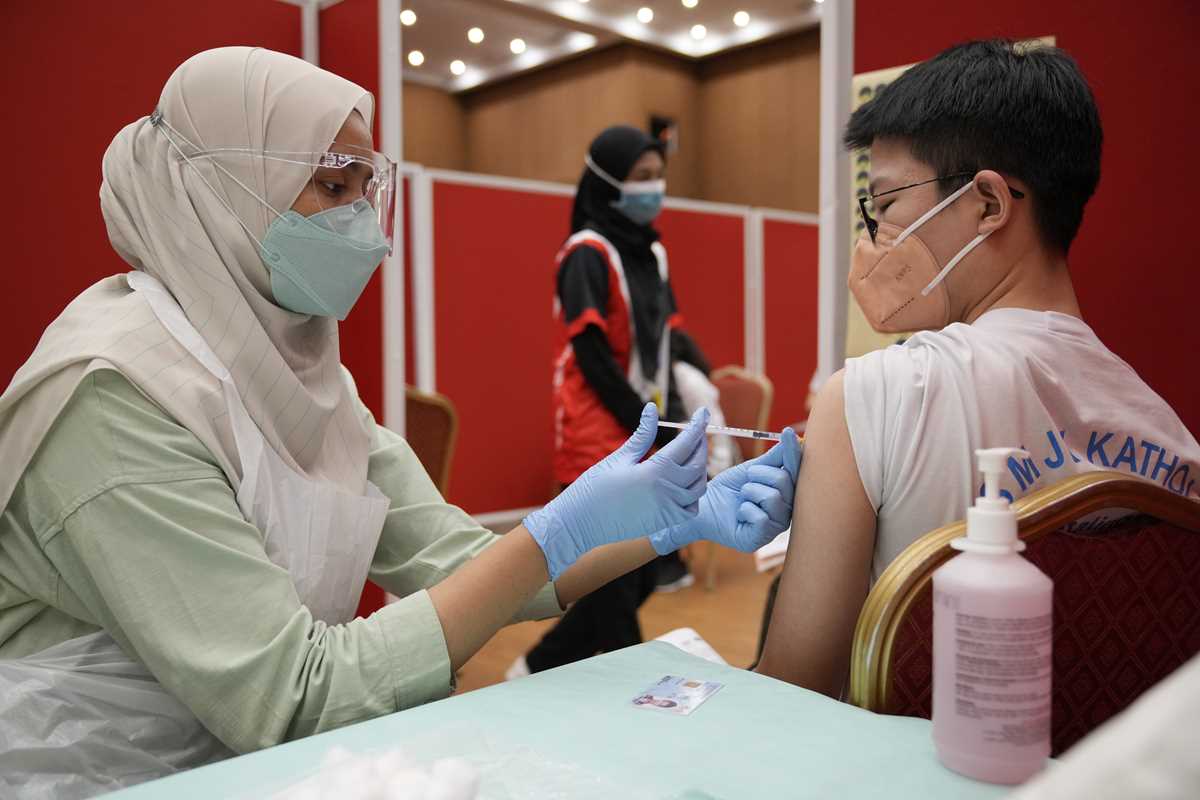 A secondary school student, receives a dose of the Pfizer vaccine against the coronavirus disease (COVID-19) at a vaccine center in Shah Alam, Malaysia, Monday, Sept. 20, 2021. (AP Photo/Vincent Thian)
A secondary school student, receives a dose of the Pfizer vaccine against the coronavirus disease (COVID-19) at a vaccine center in Shah Alam, Malaysia, Monday, Sept. 20, 2021. (AP Photo/Vincent Thian)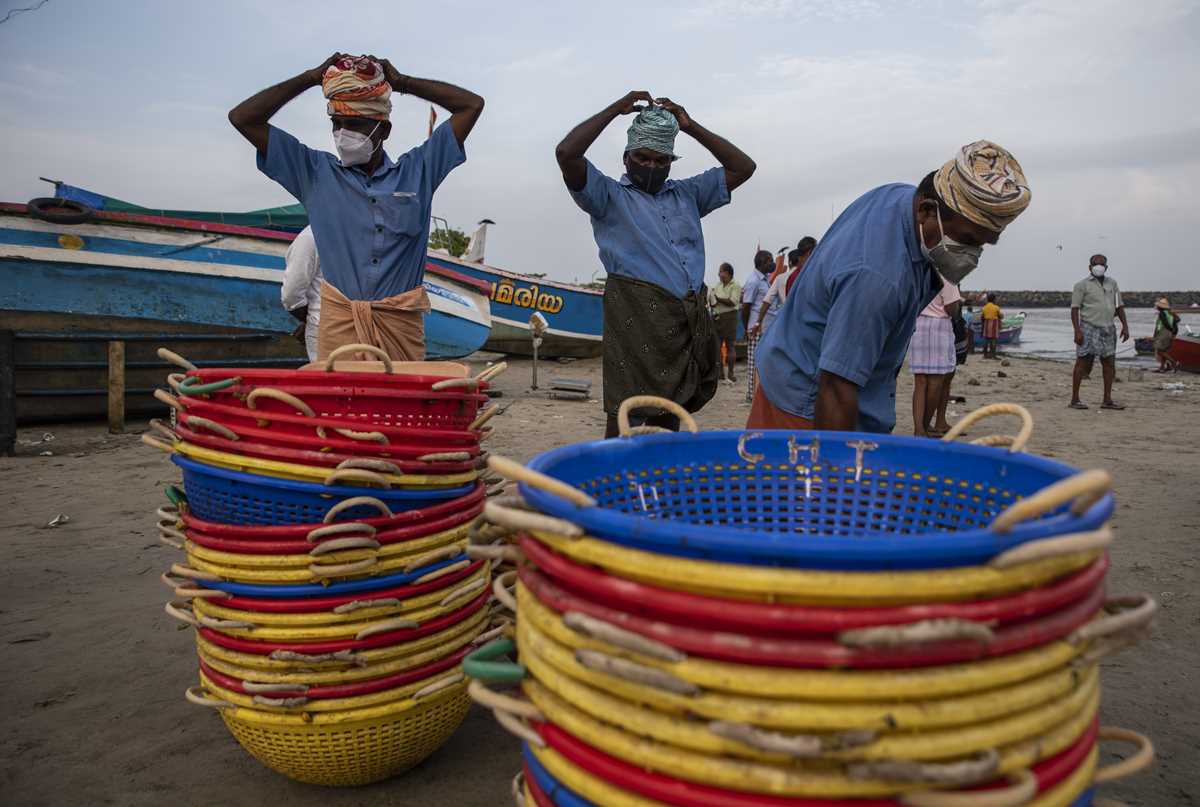 Laborers wearing masks as a precaution against COVID-19 get ready to collect fish from a fishing boat on the Arabian Sea coast in Kochi, Kerala state, India, Monday, Sept.20, 2021. The tiny southern state continues to battle the highest number of coronavirus cases in the country. (AP Photo/R S Iyer)
Laborers wearing masks as a precaution against COVID-19 get ready to collect fish from a fishing boat on the Arabian Sea coast in Kochi, Kerala state, India, Monday, Sept.20, 2021. The tiny southern state continues to battle the highest number of coronavirus cases in the country. (AP Photo/R S Iyer) People wait in line to be vaccinated with the AstraZeneca COVID-19 vaccine, in Managua, Nicaragua, Monday, Sept. 20, 2021. (AP Photo/Miguel Andres)
People wait in line to be vaccinated with the AstraZeneca COVID-19 vaccine, in Managua, Nicaragua, Monday, Sept. 20, 2021. (AP Photo/Miguel Andres)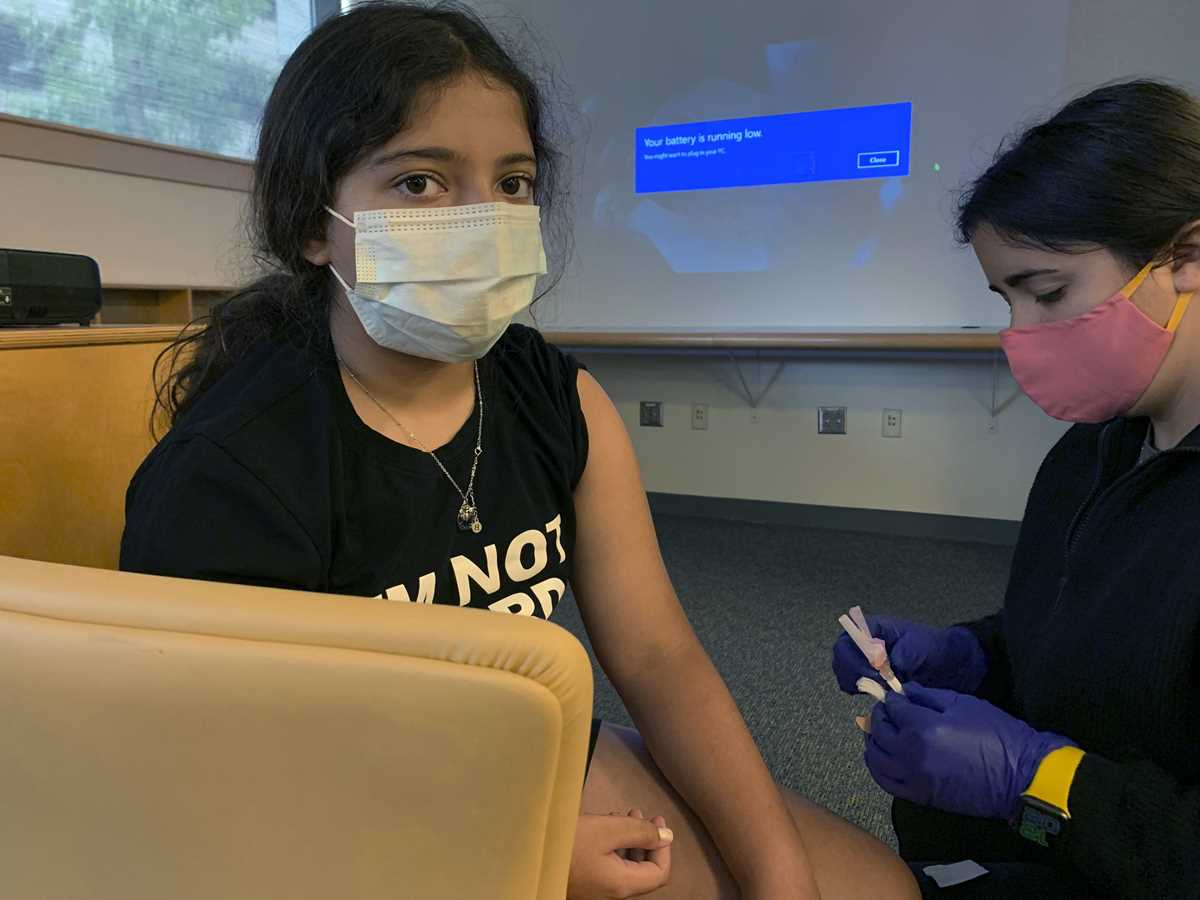 This photo provided by Nisha Gandhi shows Maya Huber taking part in Pfizer COVID-19 vaccine study at Rutgers University on June 14 2021 in New Brunswick, N.J. Maya does not know if she is receiving the vaccine or the placebo.
Pfizer says its COVID-19 vaccine works for children ages 5 to 11. The vaccine maker said Monday, Sept. 20, it plans to seek authorization for this age group soon in the U.S., Britain and Europe. The vaccine made by Pfizer and its German partner BioNTech already is available for anyone 12 and older. (Nisha Gandhi via AP)
This photo provided by Nisha Gandhi shows Maya Huber taking part in Pfizer COVID-19 vaccine study at Rutgers University on June 14 2021 in New Brunswick, N.J. Maya does not know if she is receiving the vaccine or the placebo.
Pfizer says its COVID-19 vaccine works for children ages 5 to 11. The vaccine maker said Monday, Sept. 20, it plans to seek authorization for this age group soon in the U.S., Britain and Europe. The vaccine made by Pfizer and its German partner BioNTech already is available for anyone 12 and older. (Nisha Gandhi via AP)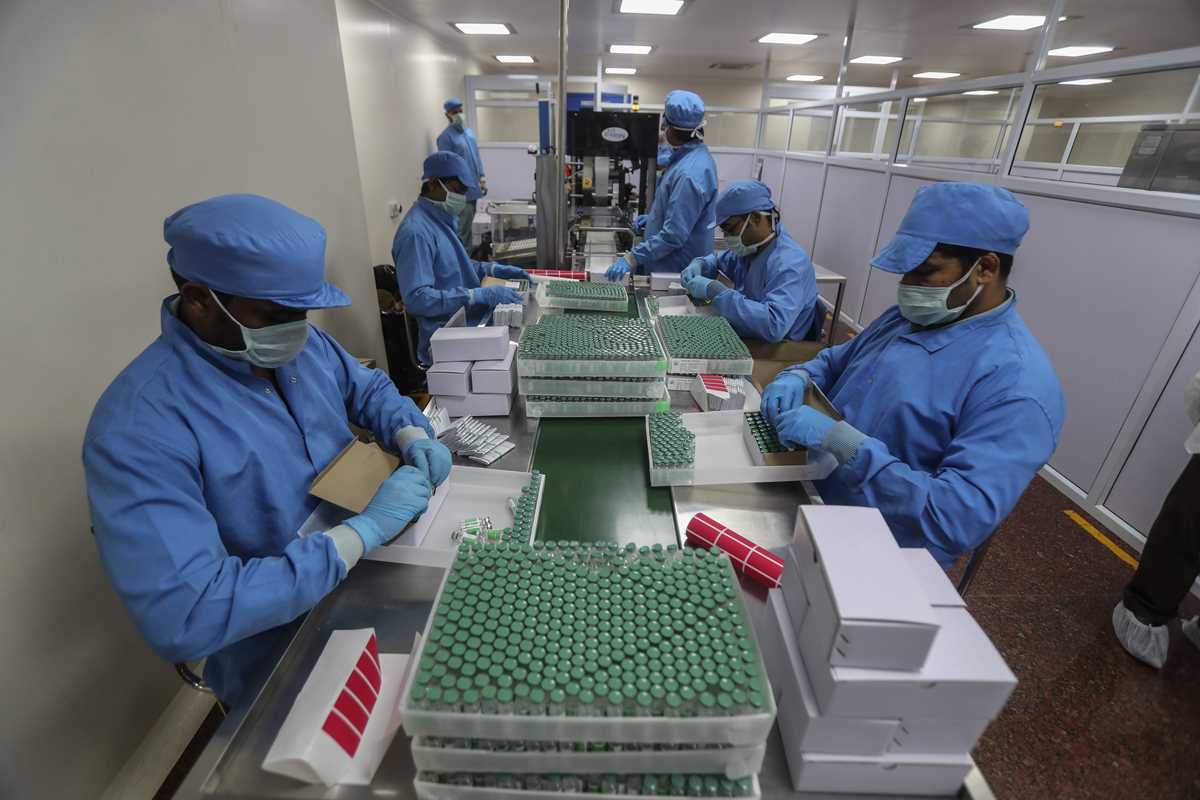 FILE- In this Jan. 21, 2021, file photo, employees pack boxes containing vials of Covishield, a version of the AstraZeneca vaccine at the Serum Institute of India in Pune, India. India, the world's largest vaccine producer, says it will resume exports and donations of surplus coronavirus vaccines in October after halting them during a devastating surge in domestic infections in April. (AP Photo/Rafiq Maqbool, File)
FILE- In this Jan. 21, 2021, file photo, employees pack boxes containing vials of Covishield, a version of the AstraZeneca vaccine at the Serum Institute of India in Pune, India. India, the world's largest vaccine producer, says it will resume exports and donations of surplus coronavirus vaccines in October after halting them during a devastating surge in domestic infections in April. (AP Photo/Rafiq Maqbool, File)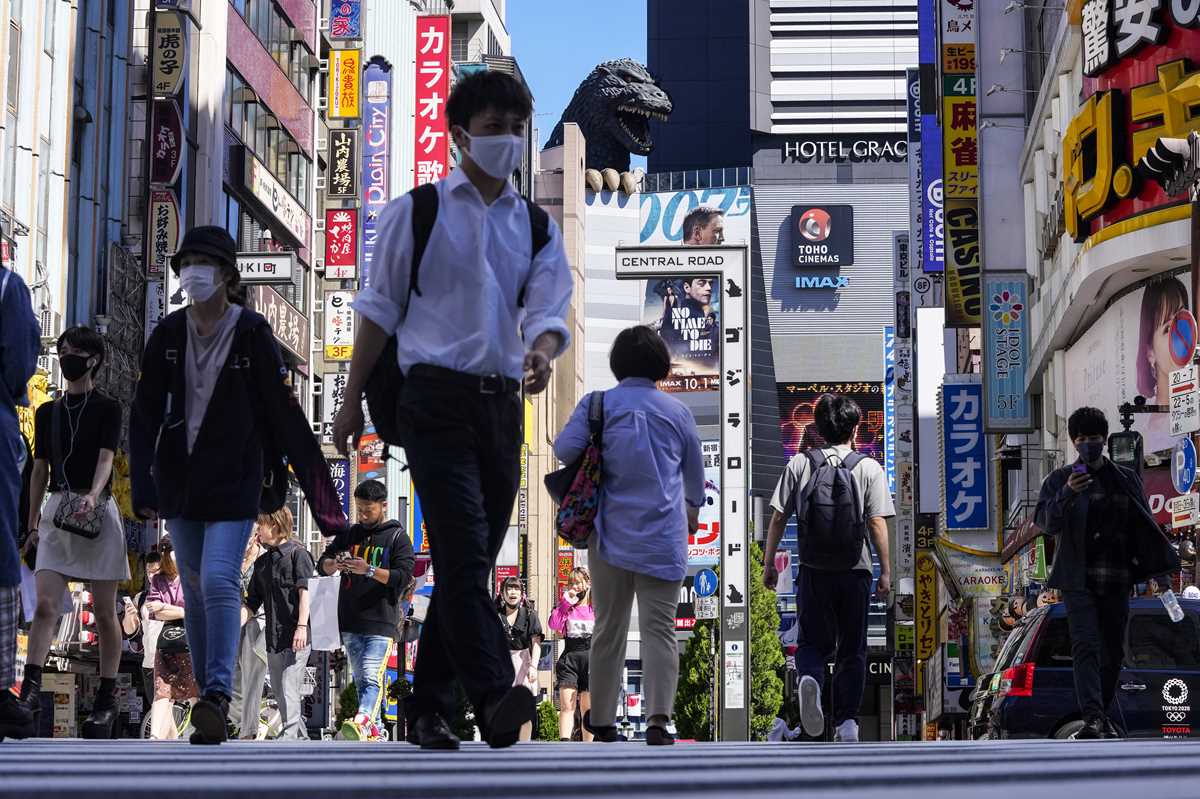 People wearing face masks to protect against COVID-19 walk past a crossing in Shinjuku, an entertainment district of Tokyo, Monday, Sept. 20, 2021. (AP Photo/Kiichiro Sato)
People wearing face masks to protect against COVID-19 walk past a crossing in Shinjuku, an entertainment district of Tokyo, Monday, Sept. 20, 2021. (AP Photo/Kiichiro Sato) Health workers administer doses of the Pfizer-BioNTech COVID-19 vaccine at a hospital in Bangkok, Thailand, Tuesday, Sept. 21, 2021. Bangkok Metropolitan Administration inoculated 12-18 year old students Tuesday as part of its attempt to reopen on-site schools. (AP Photo/Sakchai Lalit)
Health workers administer doses of the Pfizer-BioNTech COVID-19 vaccine at a hospital in Bangkok, Thailand, Tuesday, Sept. 21, 2021. Bangkok Metropolitan Administration inoculated 12-18 year old students Tuesday as part of its attempt to reopen on-site schools. (AP Photo/Sakchai Lalit)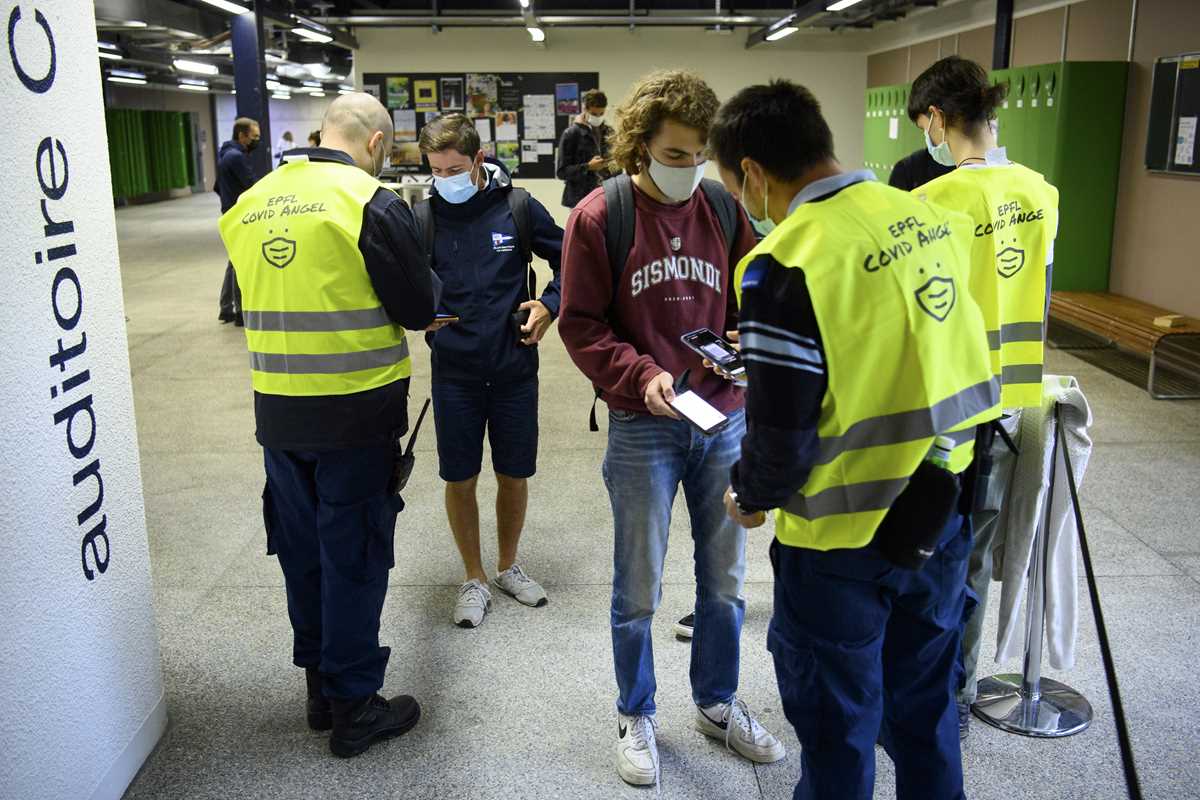 Security staff of the EPFL Covid Angels control the Covid Certificate of students before they enter into an auditorium at the Swiss Federal Institute of Technology, EPFL, in Lausanne, Switzerland, Tuesday, Sept. 21, 2021. The Covid pass will be required from 20 September for students to attend classes in person. (Laurent Gillieron/Keystone via AP)
Security staff of the EPFL Covid Angels control the Covid Certificate of students before they enter into an auditorium at the Swiss Federal Institute of Technology, EPFL, in Lausanne, Switzerland, Tuesday, Sept. 21, 2021. The Covid pass will be required from 20 September for students to attend classes in person. (Laurent Gillieron/Keystone via AP)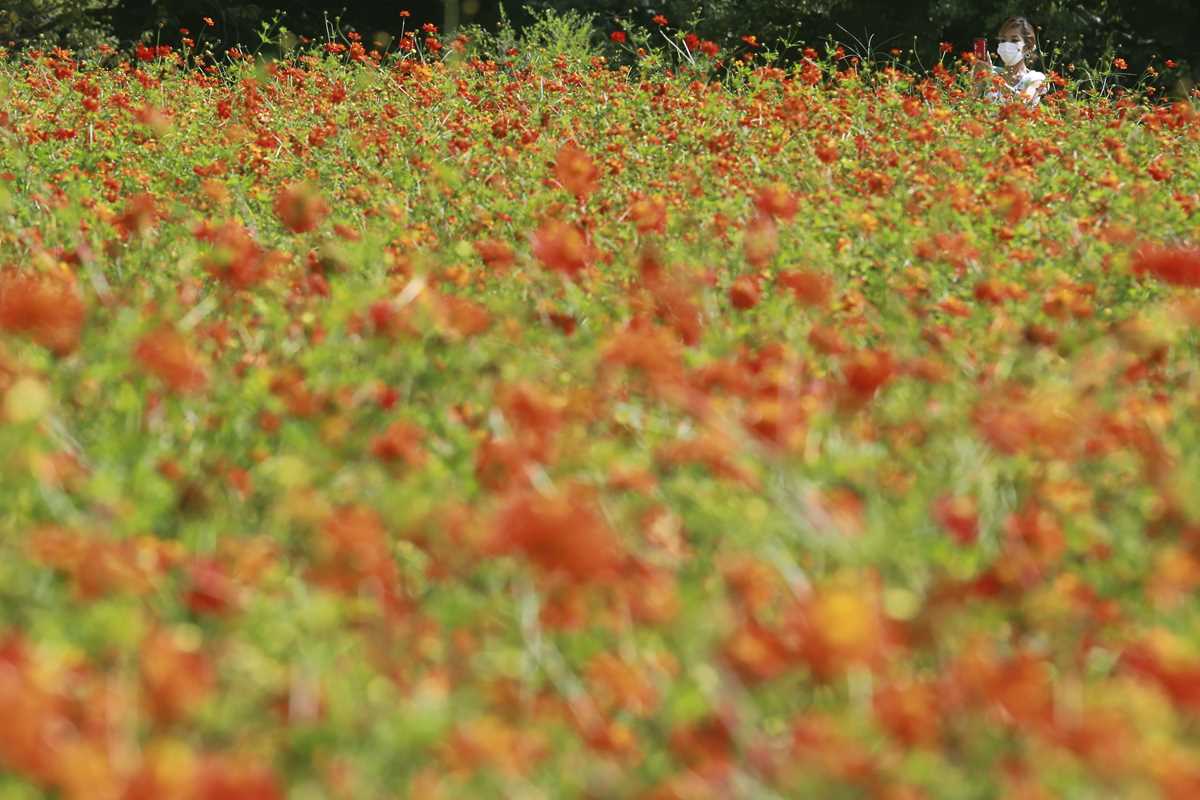 A woman wearing face masks to protect against the spread of the coronavirus enjoy the field of blooming cosmos flowers at the Hamarikyu Gardens in Tokyo, Tuesday, Sept. 21, 2021. (AP Photo/Koji Sasahara)
A woman wearing face masks to protect against the spread of the coronavirus enjoy the field of blooming cosmos flowers at the Hamarikyu Gardens in Tokyo, Tuesday, Sept. 21, 2021. (AP Photo/Koji Sasahara)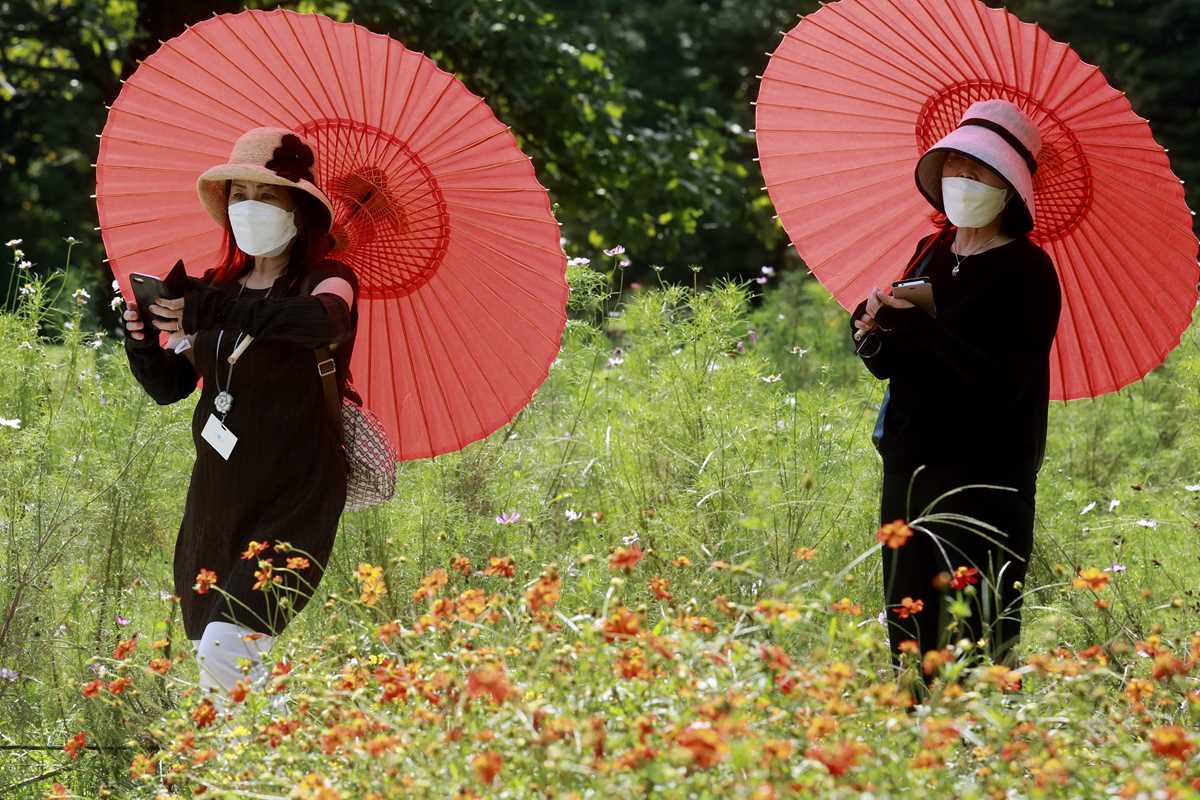 People wearing face masks to protect against the spread of the coronavirus enjoy the field of cosmos at the Hamarikyu Gardens in Tokyo, Tuesday, Sept. 21, 2021. (AP Photo/Koji Sasahara)
People wearing face masks to protect against the spread of the coronavirus enjoy the field of cosmos at the Hamarikyu Gardens in Tokyo, Tuesday, Sept. 21, 2021. (AP Photo/Koji Sasahara)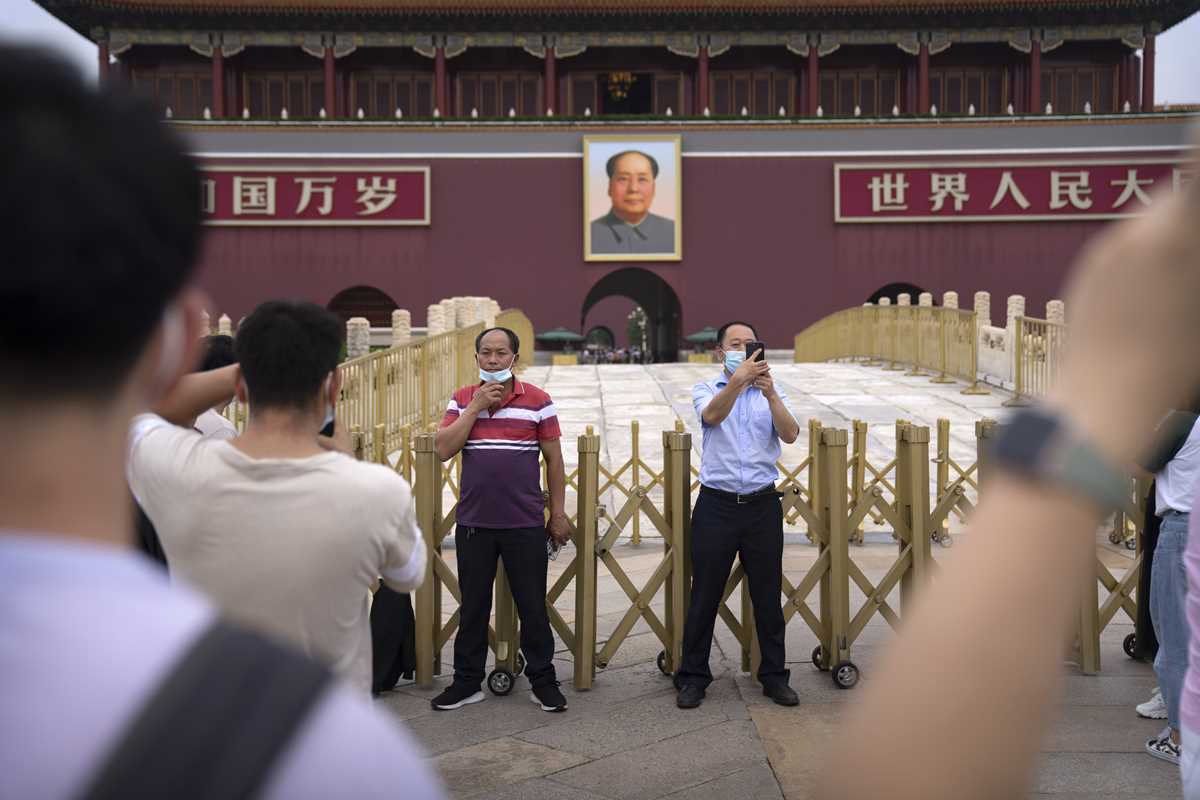 Visitors wearing face masks pose for photos near a large portrait of Chinese leader Mao Zedong on Tiananmen Gate near Tiananmen Square in Beijing, Saturday, Sept. 18, 2021. China's "zero tolerance" strategy of trying to isolate every case and stop transmission of the coronavirus has kept kept the country where the virus first was detected in late 2019 largely free of the disease. (AP Photo/Mark Schiefelbein)
Visitors wearing face masks pose for photos near a large portrait of Chinese leader Mao Zedong on Tiananmen Gate near Tiananmen Square in Beijing, Saturday, Sept. 18, 2021. China's "zero tolerance" strategy of trying to isolate every case and stop transmission of the coronavirus has kept kept the country where the virus first was detected in late 2019 largely free of the disease. (AP Photo/Mark Schiefelbein)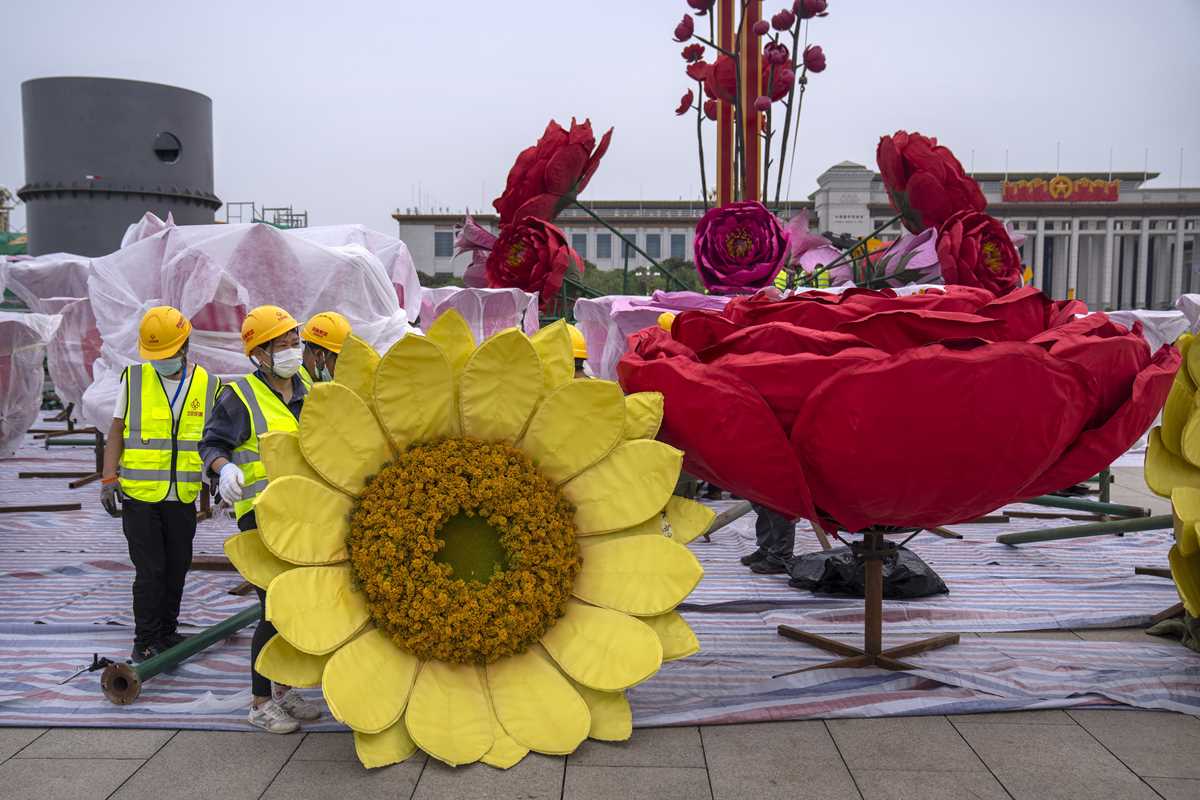 In this Sept. 18, 2021, file photo, workers move a giant flower blossom as part of preparations for China's National Day holiday on Tiananmen Square in Beijing. China's "zero tolerance" strategy of trying to isolate every case and stop transmission of the coronavirus has kept kept the country where the virus first was detected in late 2019 largely free of the disease. (AP Photo/Mark Schiefelbein, File)
In this Sept. 18, 2021, file photo, workers move a giant flower blossom as part of preparations for China's National Day holiday on Tiananmen Square in Beijing. China's "zero tolerance" strategy of trying to isolate every case and stop transmission of the coronavirus has kept kept the country where the virus first was detected in late 2019 largely free of the disease. (AP Photo/Mark Schiefelbein, File)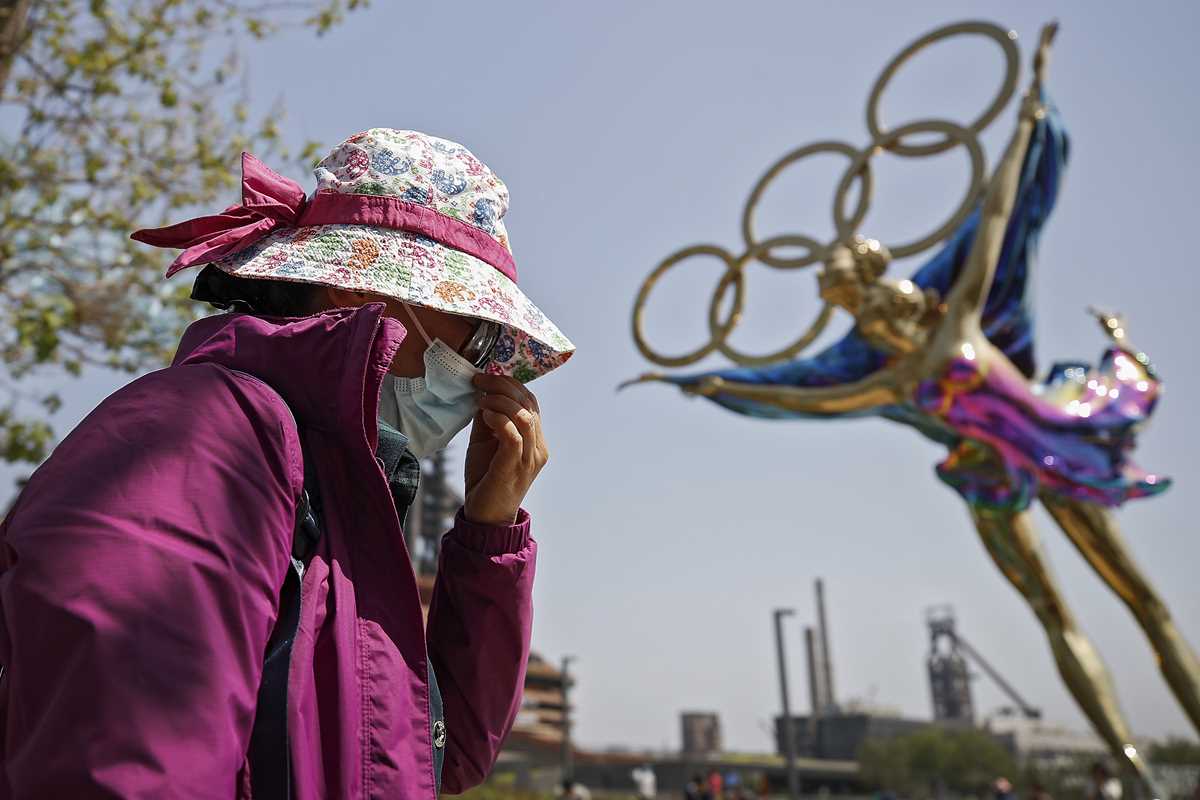 In this May 2, 2021, file photo, a woman adjusts her face mask as she walks by a statue featuring the Beijing Winter Olympics figure skating on display at the Shougang Park in Beijing. China's "zero tolerance" strategy of trying to isolate every case and stop transmission of the coronavirus has kept kept the country where the virus first was detected in late 2019 largely free of the disease. (AP Photo/Andy Wong, File)
In this May 2, 2021, file photo, a woman adjusts her face mask as she walks by a statue featuring the Beijing Winter Olympics figure skating on display at the Shougang Park in Beijing. China's "zero tolerance" strategy of trying to isolate every case and stop transmission of the coronavirus has kept kept the country where the virus first was detected in late 2019 largely free of the disease. (AP Photo/Andy Wong, File)WASHINGTON — President Joe Biden is betting on millions more rapid, at-home tests to help curb the latest deadly wave of the COVID-19 pandemic.
Surging infections are overloading hospitals and threatening to shutter some classrooms. However, the tests are quickly disappearing from pharmacy shelves in many parts of the U.S., and manufacturers say it will take them weeks to ramp up production. Production was decreased after demand for the tests plummeted in early summer.
The large commercial labs that process most tests performed at hospitals and testing sites report plenty of capacity. LabCorp, one of the biggest laboratory chains, said last week it was delivering results for 150,000 tests daily, with the ability to double that number.
Rapid tests can be done anywhere and have a 20-minute turnaround time, but most school testing programs still rely on tests processed in labs, which return results in a day or two.
The Department of Health and Human Services announced a $2 billion plan to purchase rapid tests. For now, retail chains like CVS and Walgreens have placed limits on how many at-home tests customers can buy.
Abbott Laboratories, the country’s largest rapid test maker, says it is currently producing “tens of millions” of its BinaxNOW tests per month and working to increase capacity in the coming weeks.
___
MORE ON THE PANDEMIC:
— Johnson & Johnson: Booster dose provides strong response
— China keeps virus at bay, at high cost, ahead of Olympics
— Thai campaign to vaccinate schoolchildren makes progress
— Q&A: America’s new COVID-19 rules for international travel
___
— See AP coverage at https://apnews.com/hub/coronavirus-pandemic
___
HERE’S WHAT ELSE IS HAPPENING:
BUCHAREST, Romania — Romania’s chief vaccination coordinator says vulnerable people likely will start receiving third vaccine doses against COVID-19 next week.
Romania reported 6,789 new daily cases on Tuesday, the highest number since December. The increased cases and waning vaccinations are putting a strain on the health care system.
“The focus must remain on increasing rate vaccination coverage,” chief vaccination coordinator Valeriu Gheorghita says, “while enhancing the immune response of vulnerable people who have already received the first vaccination.”
The boosters will target people at risk of developing severe forms of disease from COVID-19, as well as critical workers such as medical staff. A decision on the third shots will be made in the coming days, he says.
Romania has recorded more than 1.1 million confirmed infections and 35,721 confirmed deaths.
___
BEIJING — China’s “zero tolerance” strategy of trying to isolate every case and stop transmission of the coronavirus has kept the country of 1.4 billion people largely free of the disease.
But the public and businesses are paying a steep price. The government has renewed city lockdowns and travel controls in some areas to quash outbreaks that began in July. Most of China is open for travel, but tourists are reluctant to risk getting caught in a lockdown. That led to a slump in August consumer spending.
International athletes are due to compete in the Winter Olympics in Beijing in February, but authorities haven’t said if spectators from abroad will be allowed into the country.
China has reported 4,636 confirmed deaths -- none since February -- and 95,577 confirmed cases since early 2020. The total reported cases is smaller than one-day new infections in the United States, India and some other countries.
___
NEW DELHI — India says the British government’s decision not to recognize coronavirus vaccine certificates issued by Indian authorities is a “discriminatory policy” that will impact its citizens who want to travel to that country.
Foreign Secretary Harsh Vardhan Shringla says the new rules could force India to “impose reciprocal measures” if the matter is not resolved.
The new rules require Indians visiting the U.K to quarantine themselves for 10 days and undergo COVID-19 tests even if they are fully vaccinated with AstraZeneca vaccines made under license in India.
The rules take effect next month. India’s Serum Institute, which makes the AstraZeneca vaccine, has not applied for its approval by the European Union.
Most people in India have been vaccinated with the Indian-made AstraZeneca vaccine. Others have received COVAXIN, which is not used in Britain.
India, the world’s largest vaccine producer, said Monday it will resume exports and donations of surplus coronavirus vaccines in October after a several-month freeze due to a massive surge in domestic infections.
___
WARSAW, Poland — Poland’s government is recommending a third dose of vaccine to medical workers and people over age 50.
Deputy Health Minister Waldemar Kraska says the third dose is recommended after six months from the full immunization, also with the one-shot Johnson & Johnson vaccines. The booster will be administered with Pfizer and Moderna products, which health experts say can be mixed with other vaccines.
Registration for the third dose will start Sept. 24.
In Poland, more than 19 million of the 38 million population have been fully immunized. There have been more than 75,500 confirmed deaths.
___
BANGKOK — Health officials in Bangkok have made headway in their effort to vaccinate children against the coronavirus, giving shots of the Pfizer vaccine to students ages 12 to 18 with underlying diseases.
Vaccinations for that age group were first offered last month through hospitals, but now are being arranged by schools. A separate campaign by a medical research institute on Monday began inoculating children aged 10 to 18 with China’s Sinopharm vaccine.
On Tuesday, 1,500 students received shots of the Pfizer vaccine, 800 for the first time and 700 as a follow-up to their first shot in August.
The Health Ministry plans to give Pfizer shots to all students ages 12 to 18 nationwide on Oct. 4, starting with the 29 provinces most affected by the coronavirus, including Bangkok. About 41% of the population is fully vaccinated.
The Health Ministry on Tuesday announced 10,919 cases and 143 deaths, bringing the totals to 1.5 million confirmed cases and 15,612 confirmed deaths.
___
COLOMBO, Sri Lanka — Sri Lankan health officials say more than 50% of the island nation’s 22 million people are fully vaccinated.
According to the health ministry latest statistics, 11.1 million of the 22 million population have been fully inoculated with the COVID-19 vaccines. Sri Lanka expedited the inoculation drive two months ago when the number of positive cases and deaths began surging due to the rapid spreading of the delta variant.
Sri Lanka has been using Sinopharm, AstraZeneca, Pfizer, Moderna and Sputnik V vaccines. The health ministry plans inoculate citizens above 20 years old by the end of October.
When the spike came in July, daily positive cases surpassed 3,000. The number is now below 2,000. Sri Lanka has registered 504,491 confirmed cases and 12,125 confirmed deaths.
___
HELSINKI — Finland plans to vaccinate all people over age 12 for a third time with a coronavirus vaccine shot after getting the expected approval from a state health panel later this year.
Finland has already entered into a procurement agreement for coronavirus vaccines, according to the minister for family affairs and social services Krista Kiuru. Booster shots are currently offered in Finland only to the estimated 50,000 people suffering from severely weakened immune systems, including cancer patients and people who have received organ transplants.
Hanna Nohynek, the chief physician for the Finnish Institute for Health and Welfare, says the third dose of the COVID-19 vaccine is expected to cause similar side effects.
Some 73% of Finland’s entire population have received a first coronavirus vaccine shot and 59% have gotten the second shot.
___
ISTANBUL — Turkish Health Minister Fahrettin Koca says more than half of the country is fully vaccinated against COVID-19.
“Our success against the epidemic will increase as the rate of two doses and full vaccination rises,” he tweeted. Health Ministry figures show 42.3 million second doses have been given from a total population of 83.6 million.
Daily rates of infection remain at more than 20,000 a day, having surged after the easing of restrictions in July. There were 27,688 confirmed cases and 231 confirmed deaths reported on Monday.
___
LONDON — Johnson & Johnson released data showing that a booster dose to its one-shot coronavirus vaccine provides a strong immune response months after people receive a first dose.
J&J said in a statement Tuesday that it ran two early studies in people previously given its vaccine and found that a second dose produced an increased antibody response in adults from age 18 to 55. The study’s results haven’t yet been peer-reviewed.
While the single-dose vaccine remains strongly effective, “a booster shot further increases protection against COVID-19 and is expected to extend the duration of protection significantly,” Dr. Paul Stoffels, J&J’s chief scientific officer, said in a statement.
The company previously published data showing its one-shot dose provided protection for up to eight months after immunization. It also pointed to recent real-world data showing 79% protection against coronavirus infection and 81% protection against COVID-19 hospitalization in the U.S., even as the contagious delta variant began spreading.
The company is in talks with regulators including the U.S. Food and Drug Administration, the European Medicines Agency and others regarding using booster doses of its vaccine.
___
MELBOURNE, Australia — Hundreds of demonstrators have marched in the streets of Australia’s second-largest city to protest against mandatory coronavirus vaccine rules in the construction industry.,
The protest Tuesday in Melbourne was aimed at a Victoria state government mandate requiring all construction workers to get vaccinated.
The march came a day after riot police were called in to disperse about 500 protesters who smashed the door at the offices of the Construction, Forestry, Maritime, Mining and Energy Union, which represents construction workers.
On Monday night, the state government announced that the construction industry would be shut down from Tuesday for two weeks in metropolitan Melbourne and some regional areas.
Officials say all worksites will need to demonstrate compliance with health directions prior to reopening, including that staff have had at least one dose of a vaccine before they return to work Oct. 5.
___
HANOI, Vietnam — Vietnamese authorities are relaxing some pandemic restrictions in Hanoi starting Tuesday after two months of lockdown to contain a surge in coronavirus cases.
An order signed by the mayor Monday evening will allow the opening of government offices, markets, essential services such as banking, logistics and take-away restaurants.
But schools will remain closed, public events and gatherings of more than 10 people are still banned and public transport including train and air travel stay suspended. Hanoi will also maintain 22 checkpoints on the outer ring roads to control travel into the city.
A dozen of high risk neighborhoods in Hanoi where recent virus cases were found will continue to be in lockdown.
Since July, Vietnam has enabled a strict lockdown order for more than half of the country in an effort to contain the spread of the delta variant.
___
WASHINGTON — Aiming to pressure wealthy countries to boost their investment in global COVID-19 vaccine sharing, the Open Society Foundations is devoting a new $30.5 million pledge to address inequity in the distribution of the live-saving shots.
The funds will support vaccine access and distribution efforts in lower income countries and comes ahead of a virtual COVID-19 vaccination summit on Wednesday to be convened by President Joe Biden on the margins of the United Nations General Assembly.
Mark Malloch-Brown, president of the Open Society Foundations, highlighted that well-off nations have fallen behind their global vaccine sharing pledges and are hoarding doses that could be administered immediately in poorer countries.
“Wealthy countries need to stop stockpiling doses, forcing the rest of the world to rely on handouts. Nations with means must do better,’” he said.
The new pledge brings the George Soros-backed nonprofit’s spending on COVID-19 to more than $230 million.
___
OMAHA, Neb. — Gov. Pete Ricketts is resurrecting a version of Nebraska’s daily virus reporting dashboard website because the number of COVID-19 hospitalizations has continued to rise through the summer.
The state eliminated its daily virus dashboard in June at the same time the last of Ricketts’ emergency orders related to the pandemic were allowed to expire and cases were low. At the end of June, the state was reporting 253 virus cases per week and 28 people were hospitalized statewide.
The state’s decision to stop providing daily COVID-19 updates was widely criticized by health experts who use the data to track the virus’ spread. A group of 11 state senators wrote a letter to Ricketts last month urging him to reinstate the daily virus dashboard.
The state launched a weekly website to report some virus numbers in July but it didn’t offer as much detail and information as the old daily site. As of the state’s most recent update last Wednesday, 415 people were hospitalized with the virus.
Over the past week, the number of people hospitalized with the virus accounted for more than 10% of the state’s available hospital beds, Ricketts said. About 28% of the state’s adult hospital beds and 23% of adult intensive care beds remained available statewide on Monday.
___
Before you consider Pfizer, you'll want to hear this.
MarketBeat keeps track of Wall Street's top-rated and best performing research analysts and the stocks they recommend to their clients on a daily basis. MarketBeat has identified the five stocks that top analysts are quietly whispering to their clients to buy now before the broader market catches on... and Pfizer wasn't on the list.
While Pfizer currently has a "Hold" rating among analysts, top-rated analysts believe these five stocks are better buys.
View The Five Stocks Here
Wondering what the next stocks will be that hit it big, with solid fundamentals? Click the link below to learn more about how your portfolio could bloom.
Get This Free Report